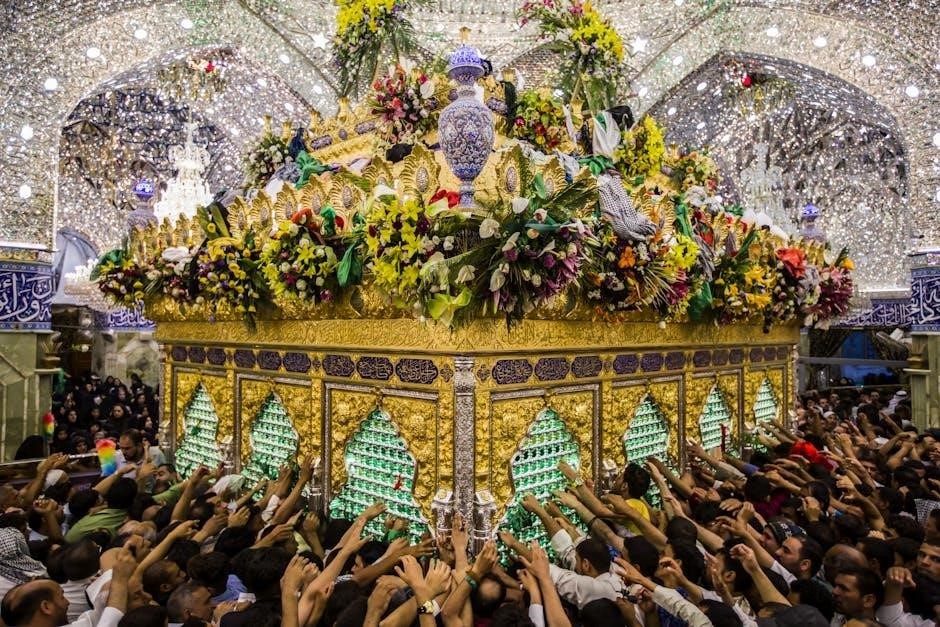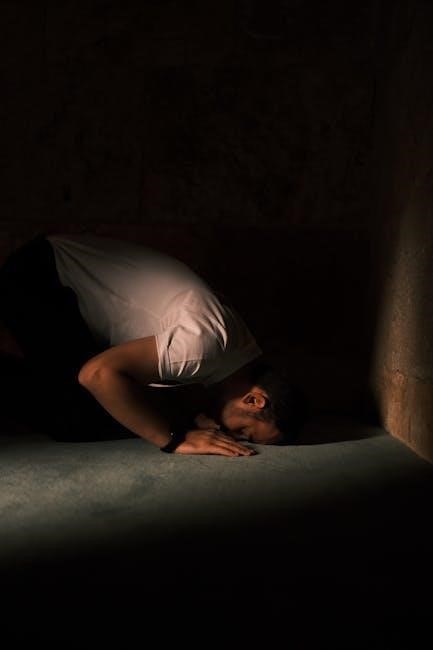This beautiful supplication‚ “Allahumma Hdini Fiman Hadayt‚” is a significant Dua in Islamic prayer‚ particularly recited during Qunoot․ It seeks divine guidance‚ protection‚ and blessings‚ emphasizing faith and devotion․
Overview of the Dua
“Allahumma Hdini Fiman Hadayt” is a heartfelt supplication seeking divine guidance‚ forgiveness‚ and protection․ It is a comprehensive prayer recited during Qunoot‚ emphasizing reliance on Allah’s mercy and wisdom․ The Dua consists of multiple parts‚ each addressing different aspects of spiritual growth and protection from misguidance․ It begins with a plea for guidance among those Allah has rightly guided and ends with a request for blessings in all that He has granted․ The supplication is rich in meaning‚ reflecting the believer’s desire to stay on the righteous path and avoid harm․ Its structure is simple yet profound‚ making it accessible for recitation in various prayer settings․ The Dua also highlights the importance of seeking refuge in Allah’s divine plan and trusting in His decisions; It is a powerful tool for strengthening one’s faith and connection with the Almighty․
Historical Context and Origins
The Dua “Allahumma Hdini Fiman Hadayt” is deeply rooted in Islamic tradition‚ particularly within the Qunoot prayer․ It is believed to have been recited by early Muslim scholars and companions of the Prophet Muhammad (peace be upon him) as a means of seeking divine guidance and protection․ The supplication is mentioned in various Islamic texts‚ including the Shafiye Doctrine‚ where it is highlighted for its significance in worship․ Historically‚ this Dua has been a cornerstone of Qunoot prayers‚ especially during times of hardship or seeking blessings․ Its origins trace back to the Prophet’s teachings‚ emphasizing reliance on Allah’s wisdom and mercy․ Over time‚ it has been passed down through generations‚ maintaining its authenticity and spiritual value․ Scholars‚ such as Anas ibn Malik‚ have referenced this Dua in their works‚ further solidifying its place in Islamic heritage․ Its enduring presence reflects its importance in fostering a deeper connection with the divine․

Significance of the Dua in Islamic Prayer
The Dua “Allahumma Hdini Fiman Hadayt” holds profound significance in Islamic worship‚ especially during Qunoot‚ as it seeks divine guidance‚ protection‚ and blessings‚ fostering a deeper connection with Allah․
Role in Qunoot Prayer
The Dua “Allahumma Hdini Fiman Hadayt” plays a vital role in Qunoot prayers‚ particularly in the Shafi’i school of thought․ It is recited during times of distress or calamity‚ seeking divine guidance and protection․ The supplication is often recited by the Imam or the congregation collectively‚ emphasizing the community’s plea for Allah’s mercy․ Its inclusion in Qunoot highlights its importance as a means of seeking refuge and strength in challenging circumstances․ Reciting the full Dua is encouraged to attain its complete blessings and spiritual benefits․ Additionally‚ it serves as a reminder of reliance on Allah’s wisdom and grace‚ fostering a deeper connection with Him during times of need․ Proper recitation ensures its effectiveness‚ making it a cherished practice in Islamic worship․
Meaning and Interpretation
The Dua “Allahumma Hdini Fiman Hadayt” holds profound spiritual significance‚ as it is a heartfelt plea to Allah for guidance and inclusion among the righteous․ The phrase “Hdini” translates to “guide me‚” while “Fiman Hadayt” means “those whom You have guided․” This supplication reflects the believer’s humility and acknowledgment of Allah’s sovereignty in granting divine direction․ It emphasizes the desire to align oneself with the path of the righteous and the prophets‚ seeking refuge from misguidance․ The Dua also underscores the Islamic belief in the necessity of divine guidance for spiritual growth and salvation․ By reciting it‚ one reaffirms their trust in Allah’s wisdom and mercy‚ seeking to be among those blessed with steadfast faith and upright character․ This interpretation highlights its role as a powerful tool for spiritual reflection and devotion in daily life․
Spiritual Benefits and Rewards
Reciting the Dua “Allahumma Hdini Fiman Hadayt” offers numerous spiritual benefits and rewards‚ as it is a sincere supplication for divine guidance and righteousness․ This Dua strengthens one’s connection with Allah‚ fostering a deeper sense of humility and reliance on His mercy․ It is believed to bring blessings and protection‚ helping the believer avoid misguidance and stay on the straight path․ Regular recitation can enhance one’s faith‚ purify the heart‚ and grant spiritual tranquility․ Additionally‚ it is a means of seeking Allah’s forgiveness and earning His pleasure․ The Dua also serves as a shield against evil influences‚ promoting inner peace and devotion․ By invoking this prayer‚ believers can experience a heightened sense of spiritual growth and closeness to Allah‚ which is essential for a fulfilling Islamic life․
Translation and Interpretation of the Dua
This Dua seeks divine guidance‚ asking Allah to include the believer among the rightly guided․ It emphasizes trust in Allah’s wisdom and mercy․
English Translation of the Dua
The Dua “Allahumma Hdini Fiman Hadayt” translates to “O Allah‚ guide me among those whom You have guided․” This heartfelt supplication seeks divine guidance and inclusion among the righteous․ It reflects a deep trust in Allah’s wisdom and a sincere desire to follow the right path․ The prayer emphasizes humility and reliance on Allah’s mercy‚ acknowledging His sovereignty in guiding hearts․ Reciting this Dua fosters a connection with Allah‚ expressing a believer’s longing for spiritual clarity and steadfastness․ It is a poignant reminder of the importance of seeking divine assistance in navigating life’s challenges․ Through this Dua‚ Muslims affirm their faith and strive to align their actions with Allah’s will‚ embodying the essence of submission and devotion in Islam․
Transliteration for Easy Recitation
The Dua “Allahumma Hdini Fiman Hadayt” can be transliterated as: “Allāhumma hadinī fīman hadayt․” This phonetic representation helps non-Arabic speakers recite the Dua accurately․ Breaking it down:
– Allāhumma: “O Allah”
– hadinī: “guide me”
– fīman: “among those”

– hadayt: “You have guided․”
This transliteration ensures proper pronunciation and intonation‚ making it easier for learners to recite the Dua confidently․ It also aids in understanding the rhythm and flow of the Arabic text․ Many resources‚ including the full Dua PDF‚ provide transliterations to facilitate learning and memorization․ This approach is particularly beneficial for those unfamiliar with Arabic script but eager to connect with the Dua’s meaningful words․ The transliteration serves as a bridge‚ enabling believers to recite the Dua with accuracy and devotion‚ regardless of their linguistic background․ It is a practical tool for spiritual growth and connection with Allah’s guidance․

Benefits of Reciting “Allahumma Hdini Fiman Hadayt”
Reciting this Dua brings guidance‚ protection from misguidance‚ and strengthens faith‚ fostering a deeper connection with Allah’s wisdom and blessings in daily life and spiritual growth․
Seeking Guidance and Righteousness
Reciting “Allahumma Hdini Fiman Hadayt” is a powerful plea to Allah for divine guidance and righteousness․ This Dua‚ deeply rooted in Islamic spirituality‚ serves as a heartfelt request to be among those whom Allah has guided on the right path․ By reciting it‚ believers seek to align their actions and decisions with Allah’s will‚ fostering a sense of purpose and direction in life․ The Dua emphasizes the importance of sincerity and humility‚ as it acknowledges human dependence on Allah’s mercy and wisdom․ It also reflects the Islamic value of striving for righteousness‚ encouraging believers to emulate the noble character of the Prophet Muhammad (peace be upon him) and the righteous companions․ Through this Dua‚ Muslims cultivate a mindset of continuous self-improvement and spiritual growth‚ seeking to please Allah in all aspects of life․ Its recitation reinforces the belief that true guidance comes solely from Allah‚ making it a cherished supplication in daily prayers and reflections․
Protection from Misguidance
Reciting “Allahumma Hdini Fiman Hadayt” serves as a shield against misguidance‚ seeking Allah’s protection from straying off the righteous path․ This Dua is a heartfelt plea to remain steadfast on the path of truth and righteousness‚ as guided by Allah․ It reflects the belief that true guidance is a divine favor‚ and without Allah’s mercy‚ one may fall into error or darkness․ The Dua emphasizes the importance of seeking refuge in Allah from the pitfalls of misguidance‚ whether in beliefs‚ actions‚ or decisions․ By reciting it‚ believers acknowledge their vulnerability to sin and seek divine assistance to stay on the straight path․ It also underscores the Islamic concept of accountability‚ reminding believers to constantly seek Allah’s protection to avoid the consequences of misguidance in this life and the hereafter․ Regular recitation fosters a sense of reliance on Allah and strengthens one’s resolve to adhere to His teachings․ This Dua is particularly significant in a world filled with spiritual and moral challenges‚ serving as a constant reminder of the need for divine guidance and protection․
Strengthening Faith and Devotion

Reciting “Allahumma Hdini Fiman Hadayt” plays a profound role in strengthening faith and devotion․ This Dua serves as a means to deepen one’s spiritual connection with Allah‚ fostering a sense of reliance on His guidance․ By acknowledging Allah’s sovereignty over guidance‚ believers reaffirm their trust in His wisdom and mercy․ Regular recitation cultivates humility and gratitude‚ essential traits for a strong spiritual foundation․ It also encourages mindfulness of Allah’s presence in daily life‚ promoting a consistent and sincere practice of faith․ The Dua’s emphasis on seeking guidance strengthens one’s commitment to following the righteous path‚ reinforcing devotion to Islamic teachings․ Over time‚ this practice helps believers develop a resilient faith that withstands life’s challenges‚ drawing them closer to Allah and enriching their spiritual journey․

How to Recite the Dua Properly
Face Qiblah‚ raise hands‚ and recite with intention (niyyah)․ Lower gaze‚ focus on meanings‚ and maintain proper tajweed․ Ensure voice is moderate‚ not excessively loud or silent․
Step-by-Step Guide to Recitation
Begin by facing the Qiblah and ensuring you are in a state of purity (Wudu)․
Raise your hands in supplication‚ palms facing upwards‚ and recite the Dua with proper tajweed․
Lower your gaze to show humility and focus on the words being recited․
Recite the Dua slowly‚ ensuring each word is pronounced correctly and with reflection․
Maintain a moderate tone—neither too loud nor too soft—to reflect respect and sincerity․
After completing the Dua‚ take a moment to reflect on its meaning and seek guidance․
Conclude by making a personal supplication (Dua) related to your needs or desires․
This method ensures the Dua is recited with the proper etiquette and intention‚ maximizing its spiritual impact․
Recommended Times for Recitation
The Dua “Allahumma Hdini Fiman Hadayt” is most appropriately recited during the Qunoot prayer‚ particularly in the last unit (Rak’ah) of the Isha prayer‚ especially during times of hardship or calamity․ Additionally‚ it is beneficial to recite this Dua during the virtuous times such as the last third of the night‚ when Allah is said to descend to the lowest heaven seeking those who repent and forgive․ Fridays are also an excellent time for recitation‚ as they hold special significance and opportunities for accepted supplications․ Furthermore‚ during the blessed month of Ramadan‚ particularly on Laylat al-Qadr (the Night of Power)‚ reciting this Dua is highly recommended due to the increased virtue of supplications during this time․ Finally‚ it is also appropriate to recite this Dua after the obligatory prayers‚ especially Fajr and Maghrib‚ as these are times when supplications are more readily accepted․
Common Mistakes to Avoid When Reciting the Dua
When reciting the Dua “Allahumma Hdini Fiman Hadayt‚” there are several common mistakes to be mindful of to ensure its proper and effective recitation․ Firstly‚ many individuals recite the Dua without fully understanding its meaning‚ which diminishes its spiritual impact․ It is crucial to comprehend the Arabic text and its English translation to connect deeply with the supplication․ Secondly‚ rushing through the recitation is a frequent error‚ as it can lead to mispronunciation and a lack of focus․ Reciting the Dua calmly and deliberately is essential for maintaining its sanctity․ Additionally‚ some people may recite the Dua at inappropriate times‚ such as outside of the recommended periods like Qunoot in Isha prayer or during times of hardship․ Moreover‚ neglecting to maintain a sincere and focused state of mind while reciting the Dua can reduce its effectiveness․ Lastly‚ altering the Dua’s wording or structure‚ whether intentionally or unintentionally‚ should be avoided‚ as it may distort its intended meaning and significance․ By being aware of these potential pitfalls‚ one can recite the Dua in a manner that is both correct and spiritually fulfilling․

Cultural and Historical Impact of the Dua
The Dua “Allahumma Hdini Fiman Hadayt” holds profound cultural and historical significance‚ widely recited across Muslim communities worldwide․ Its inclusion in Islamic literature and scholarly works highlights its enduring influence‚ shaping spiritual practices and fostering unity among believers for centuries․
Prevalence in Different Muslim Cultures
The Dua “Allahumma Hdini Fiman Hadayt” is widely practiced across diverse Muslim cultures‚ reflecting its universal appeal․ In the Middle East‚ it is often recited during Qunoot prayers‚ while in South Asia‚ it is incorporated into daily supplications and congregational prayers․ In North Africa‚ the Dua is frequently recited during Ramadan and other sacred occasions‚ emphasizing its spiritual significance․ Similarly‚ in Southeast Asia‚ it is commonly used in mosques and homes‚ fostering a sense of unity among believers․ The Dua’s prevalence highlights its adaptability to various cultural practices while maintaining its core spiritual message․ Scholars and community leaders often emphasize its importance‚ ensuring its continued relevance across generations․ This widespread acceptance underscores its role in strengthening faith and connecting Muslims globally through shared spiritual traditions․
References in Islamic Literature
The Dua “Allahumma Hdini Fiman Hadayt” is deeply rooted in Islamic literature‚ with references found in the Quran and authentic Hadiths․ The Dua closely aligns with verses in Surah Al-Qasas‚ where guidance and divine direction are emphasized․ In Hadith literature‚ similar supplications are mentioned in the collections of Imam Bukhari and Muslim‚ particularly in the context of the Night Journey (Isra and Mi’raj)․ Classical Islamic texts‚ such as Ibn Kathir’s Tafsir al-Quran and Al-Nawawi’s Al-Azkar‚ highlight the Dua’s significance in seeking divine guidance․ Scholars have consistently praised its profundity‚ urging believers to recite it regularly․ Its presence in these revered sources underscores its importance in Islamic spirituality and practice‚ making it a cherished supplication across generations of Muslims․

Downloading and Using the Full Dua PDF
The full Dua PDF is easily accessible online‚ offering a convenient format for learning and recitation․ It provides clear Arabic text‚ translation‚ and guidance for proper practice․
Features of the PDF Version
The full Dua PDF version of “Allahumma Hdini Fiman Hadayt” offers a comprehensive and organized layout‚ making it easy to read and understand․ It includes the Arabic text in clear‚ legible font‚ along with its English translation for better comprehension․ The PDF also features transliteration‚ helping non-Arabic speakers recite the Dua accurately․ Additionally‚ it provides explanations of the Dua’s meaning‚ spiritual significance‚ and practical benefits․ The document is designed with high-quality formatting‚ ensuring readability on both mobile and desktop devices․ It may also include supplementary information‚ such as the historical context of the Dua and tips for effective recitation․ Overall‚ the PDF serves as a valuable resource for learners and practitioners seeking to deepen their connection with this powerful supplication․

How to Download the PDF
Downloading the full Dua PDF of “Allahumma Hdini Fiman Hadayt” is a straightforward process․ Visit a trusted Islamic resource website or a reliable online platform that offers Islamic supplications in PDF format․ Use the search bar to type the exact title of the Dua‚ and select the appropriate result from the search listings․ Click on the “Download” button provided on the page‚ and the PDF will be saved to your device․ Ensure you have a stable internet connection for a smooth download․ Some websites may require a quick sign-up or verification‚ but many offer the PDF for free․ Once downloaded‚ you can easily access the Dua on your device‚ print it‚ or share it with others․ This convenient format allows for easy learning and recitation anytime‚ anywhere․
Benefits of the PDF Format for Learning
The PDF format offers numerous advantages for learning the Dua “Allahumma Hdini Fiman Hadayt․” One of the primary benefits is portability‚ allowing users to carry the entire Dua in a single file on their devices․ This makes it easily accessible for study and recitation on the go․ Additionally‚ PDFs maintain consistent formatting across all devices‚ ensuring that the text appears as intended‚ which is crucial for proper pronunciation and understanding․ The ability to highlight and annotate text in PDFs aids in memorization and deeper comprehension․ Furthermore‚ PDFs can be shared effortlessly‚ enabling learners to distribute the Dua to others․ The clean and organized layout of PDFs also enhances focus‚ making the learning process more efficient․ Overall‚ the PDF format provides a practical and effective way to engage with and master the Dua․
Final Thoughts on the Importance of the Dua
The Dua “Allahumma Hdini Fiman Hadayt” holds profound significance in seeking divine guidance and steadfastness․ It reflects a deep trust in Allah’s wisdom and mercy‚ emphasizing the believer’s desire to remain on the righteous path․ This supplication is not just a prayer but a commitment to spiritual growth and submission to Allah’s will․ Its inclusion in the Qunoot prayer highlights its importance in Islamic worship‚ serving as a reminder of the constant need for divine assistance․ By reciting this Dua‚ believers affirm their reliance on Allah‚ seeking protection from misguidance and strengthening their faith․ The availability of the full Dua in PDF format makes it accessible for learning and reflection‚ ensuring its timeless message continues to inspire generations․ Ultimately‚ this Dua is a powerful tool for nurturing a stronger connection with Allah and living a life guided by His light․

Additional Tips for Maximizing the Dua’s Benefits
Recite the Dua with sincerity and a pure heart․ Understand its meaning deeply and let it guide your actions․ Share its blessings with others for greater spiritual impact․
Consistency in Recitation
Consistency is key to maximizing the benefits of “Allahumma Hdini Fiman Hadayt․” Regular recitation strengthens spiritual connection and deepens understanding․ Aim to recite it daily‚ ideally during prescribed prayers or moments of reflection․ Over time‚ this practice fosters mindfulness and aligns your heart with divine guidance․ In Islamic teachings‚ consistent Dua recitation is praised for its ability to nurture steadfastness in faith․ By prioritizing this Dua‚ you cultivate a routine that seeks Allah’s help in staying guided and righteous․ Remember‚ the Prophet Muhammad (peace be upon him) emphasized the importance of regular supplication‚ as it is a means of seeking Allah’s mercy and blessings․ Make this Dua a cornerstone of your spiritual practice for lasting impact․
Understanding the Dua’s Meaning
Understanding the meaning of “Allahumma Hdini Fiman Hadayt” is essential for heartfelt recitation․ The Dua translates to “Oh Allah‚ guide me among those You have guided‚ grant me health among those You have granted health‚ and make me steadfast among those You have made steadfast․” This supplication reflects a deep trust in Allah’s wisdom and a humble request for divine guidance․ By breaking it down‚ believers can grasp its profound significance․ It emphasizes seeking Allah’s help in remaining on the right path‚ avoiding misguidance‚ and maintaining spiritual and physical well-being․ This Dua underscores the importance of aligning one’s actions and beliefs with divine teachings․ Understanding its meaning fosters a stronger spiritual connection and makes the supplication more sincere and impactful in one’s life․
